Papua New Guinea is one of the few places in the world where literal witch hunts still take place on a regular basis. Witch hunts continue to be practiced, even though engaging in a witch hunt was declared a capital offense by the government in 2013. This leads to the question of why these witch hunts still occur. The answer is probably related to the fact that in Papua New Guinea, witchcraft, sorcery, and malevolent spiritual beings are still relevant and the effects of industrialization have created more problems that can be blamed on witches.
Prehistory of Papua New Guinea
The highlands of Papua New Guinea are very rugged and treacherous. As a result, they are among the most isolated places in the world. Some parts of the region were not explored by Westerners until as late as the 1930s. In contrast, societies of the lowlands of Papua New Guinea have been in contact with the outside world for centuries.
One result of this is that the cultural development of the highlands people has been largely independent of the surrounding region. Agriculture, for example, was locally developed in the highlands around 7,000 years ago, rather than being introduced from Southeast Asia. With more time, the highlands may have become another cradle of civilization.
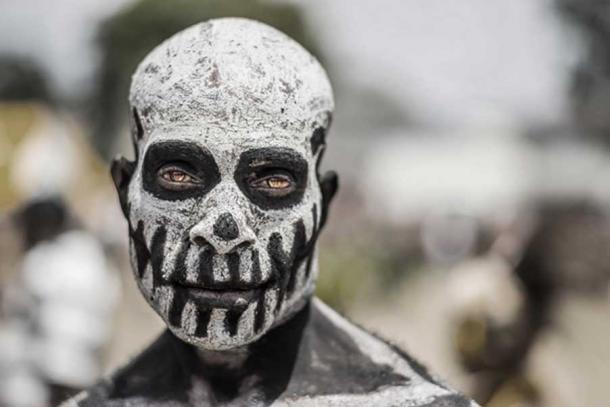
One of the tribes from the high jungle mountain areas paints themselves like undead spirits to scare the other tribes away. Everyone here is quite superstitious, and a lot of their free time is spend exchanging legends and stories. The tribe spends hours painting one another to make sure their spirit-bodies are seen from as far away as possible. (Trey Ratcliff/ CC BY NC SA 2.0 )
Many cultures of the highlands of Papua New Guinea have only recently been exposed to modern scientific explanations for diseases. And it is worth remembering that we live in a mechanistic universe where things, good or bad, sometimes happen just by chance, or by nature, rather than by the intentional actions of an intelligent agent, such as a witch. The fact that most witch hunts tend to occur in the highlands demonstrates that belief in witches is still strong in that region.
Spiritual Beliefs of the Highlands
Most of the people of Papua New Guinea traditionally believed that the world was full of natural and ancestral spirits. This belief persists today in many parts of the island nation. An example from one particular culture is belief in a race of sky beings which can be seen in the night as faint lights in the forest. These creatures are said to be man-eaters and accomplices to witches.
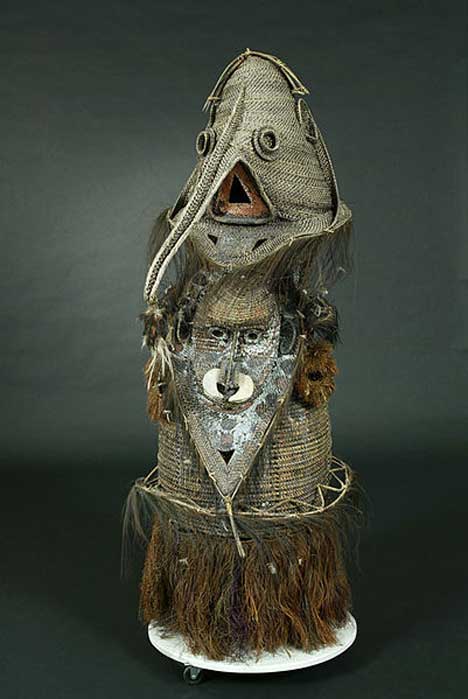
Male spirit dance mask from Kabriman Village, Blackwater River Basin, East Sepik Province, Papua New Guinea. ( The Children’s Museum of Indianapolis/ CC BY SA 3.0 )
Death, Disease, and Witches in Papua New Guinea
In most of ancient Papua New Guinea, if someone got sick, died, or even lost livestock to illness or predation, it was commonly suspected to be due to witchcraft or sorcery. The underlying spiritualist worldview behind this has not gone away; it still influences the beliefs and practices of many Papua New Guinean natives both in the highlands and in the lowlands. Because of this, it does not seem too farfetched to many Papua New Guinean natives to blame a person getting sick on an evil spirit or a witch. This is true regardless of education level and has nothing to do with intelligence.
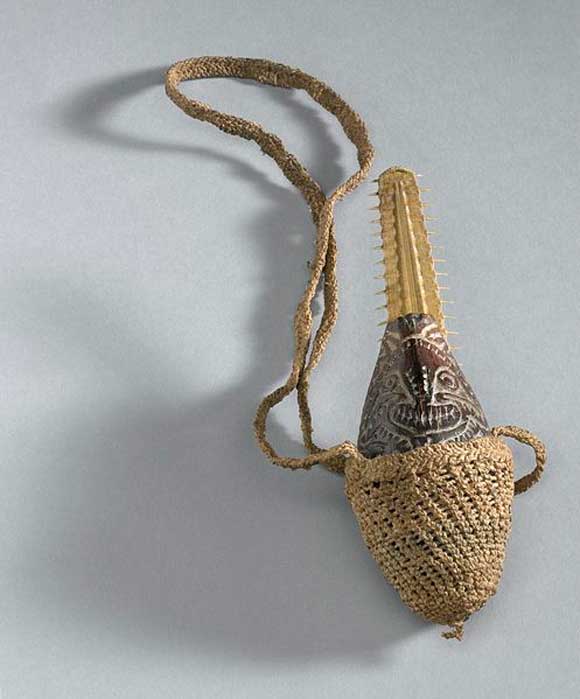
Coconut charm to ward off evil spirits, Papua New Guinea. (Wellcome Images/ CC BY 4.0 )
The Social Effects of Modern Witch Hunts
Witch hunts are not only still common in Papua New Guinea, but they appear to be increasing in frequency compared to previous generations. For example, witch hunts are no longer restricted to the rural highlands, but have spread to towns and cities. The response to accused witches is also predictably severe. People suspected of being witches are under threat of being tortured and killed . In an infamous case in 2013, a 20-year-old mother was burned alive. Her daughter was later accused of witchcraft and tortured as well, though she survived and was rescued.
The government of Papua New Guinea has officially recognized this as a serious problem and has taken steps to address violence committed against accused witches . For example, the government has recently made it law that killings connected to a witch hunt will be counted as murder.
Papua New Guinea Witchcraft and Problems of the Modern World
Witches are one explanation for why things go wrong in the world and why there is loss, illness, and death. One possible reason for the increasing frequency of witch hunts in Papua New Guinea is that more health and societal problems have emerged in recent years that can be blamed on witches.
Papua New Guinea is currently going through rapid industrialization, which is leading to problems that previous generations of Papua New Guineans did not face to the same degree. Industrialization and capitalism, for example, bring problems such as unemployment and financial insecurity due to a fluctuating economy. Furthermore, global travel and trade have brought more diseases than previous generations faced, such as the spread of HIV.
Modern problems such as rising real estate prices are also often blamed on witchcraft alongside illnesses or death. When things go wrong, humans will first look for explanations that make sense, and that are most familiar, in their cultural context.
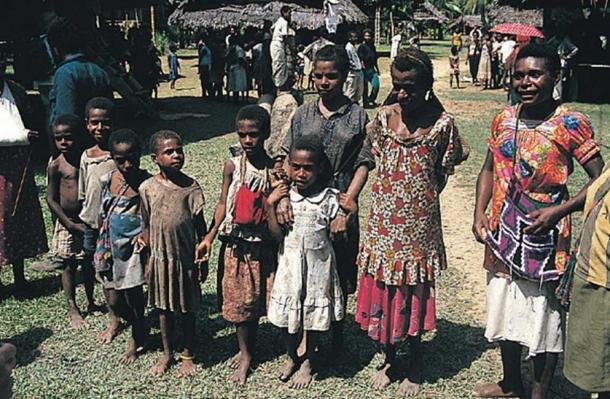
Papua New Guineans in 2005. A typical scene in a village that has lost many of its young men to the towns as rural-urban migrants. The population structure of such villages is quite unbalanced. ( Stephen Codrington / CC BY 2.5 )
Why Do Witch Hunts Persist?
Beliefs about sorcery and witchcraft are deeply ingrained in the cultures of Papua New Guinea. Many societies in Papua New Guinea, especially the highland societies, have only been recently exposed, historically speaking, to alternative explanations for why things go wrong in the world.
It is also true that the problems many of the Papua New Guinean people face have increased in recent years because of industrialization. These two factors are probably part of why witch hunts persist in the region. Humans are slow to give up tradition and they tend to hold on to their customs and beliefs more strongly when life gets difficult. This includes traditions pertaining to witchcraft.
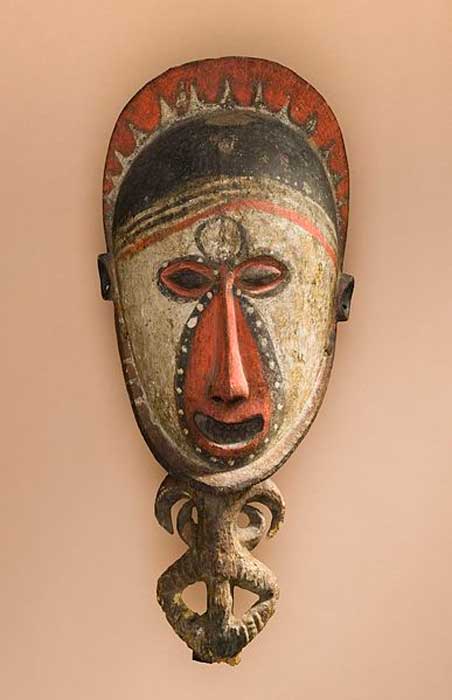
Spirit figure from Papua New Guinea, East Sepik Province, Southern Abelam or Boiken People, circa 1925. ( Public Domain )
Top Image: Papua New Guinean. There has been an increase in recent years in attacks aimed against Papua New Guinea witchcraft. Source: Trey Ratcliff/ CC BY NC SA 2.0
By Caleb Strom
Updated on April 13, 2021.
References
Lindenbaum, S. Kuru sorcery: disease and danger in the New Guinea highlands. Routledge, 2015.
Bloch, M. and J. Parry, eds. Death and the Regeneration of Life. Cambridge University Press, 1982.
Miedema, J. “The evolution of Highland Papua New Guinea societies.” (1988): 570-572.
Quinn, R. Guns, Germs & Steel: The Fate of Human Societies. Macat Library, 2017.
BBC. “PNG repeals sorcery law and expands death penalty” (2013). Available at: https://www.bbc.com/news/world-asia-22698668
The Diplomat. “Why Is Papua New Guinea Still Hunting Witches?” by Ian Lloyd Neubauer (2013). Available at: https://thediplomat.com/2018/01/why-is-papua-new-guinea-still-hunting-witches/
Foley, W. A. The Papuan languages of New Guinea. Cambridge University Press, 1986.
Denham, T. P., et al. “Origins of agriculture at Kuk Swamp in the highlands of New Guinea.” Science 301.5630 (2003): 189-193.
Related posts:
Views: 0
 RSS Feed
RSS Feed

















 April 15th, 2021
April 15th, 2021  Awake Goy
Awake Goy 



 Posted in
Posted in  Tags:
Tags: 
















